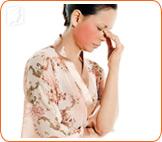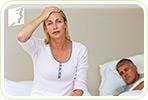
Night sweats are just one of the 34 symptoms women can encounter during menopause. The condition is one of the most common during this transitional phase and also one of the most frustrating because night sweats can be uncomfortable and interrupt sleep. However, if you make appropriate preparations to deal with them, you can lessen their impact. Read on to learn more about menopausal night sweats, how to recognize them and how to handle them.
How Can I Recognize Night Sweats?
Night sweats are often described as hot flashes nocturnal equivalent and are a common symptom of menopause. In fact, 75% of menopausal women will experience night sweats at some point during her transition. However, because no woman is the same, they affect everyone differently and can vary in duration, severity, and frequency. It is mutually accepted however, that the condition can be frustrating. Learning more about the condition though, will allow you to be more prepared to deal with it. Here are some signs to look out for:

- You wake up in the middle of the night
- Your body, nightwear, and bedding are drenched in sweat
- You find it difficult to sleep or have interrupted sleep
- You feel sudden and intense sensations of heat and become flushed easily
- Your heart rate increases
- You experience more headaches
- You often feel nauseous when you wake up
- You feel hot, perspire excessively, and get cold chills
- You are more stressed or anxious during the day

When trying to determine whether you're suffering from night sweats due to menopause, as opposed to any other medical condition, take care to listen to your body and note what changes you experience. Read on the symptoms of menopause related night sweats . While researching the symptoms of this condition, you might also recognize other menopause conditions you are experiencing.
More Information about Night Sweats
Once you've ascertained whether your night sweats are the consequence of menopause, you can begin addressing the route of the problem- mostly this is hormone imbalance. In order to alleviate not just this symptom but many of the others that can be also be experienced, start implementing simple life changes. Improving the condition of your body will leave it more capable of dealing with whatever else menopause throws at it. For more information discuss your experiences with a doctor.
Sources
- Boston Women's Health Collective. "Hot Flashes, Night Sweats and Sleep Disturbances". Our Bodies, Ourselves, 2006.
- The National Institute of Health.(n.d)."Signs of the Menopausal Transition" Retrieved from www.nih.gov
- Von Muhlen, DG, et al. "A community-based study of menopause symptoms and estrogen replacement in older women". Maturitas. Sept 1995; 22(2):71-8.

